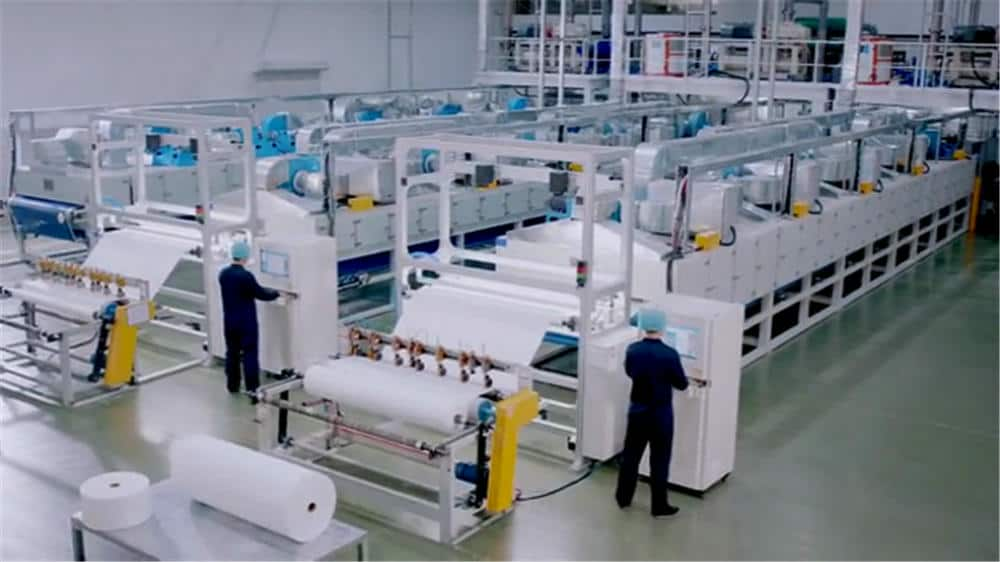In a world grappling with microscopic threats, meltblown fabric has emerged as a silent guardian. This nonwoven material, often hidden within masks and filters, plays a crucial role in safeguarding us from unseen dangers. But what is it about this seemingly simple fabric that gives it such remarkable properties? Let’s dive into the fascinating world of meltblown fabric and understand why it has become indispensable.

What Makes Meltblown Fabric Unique?
Meltblown fabric, at its core, is a web of incredibly fine fibers, typically made from thermoplastic polymers like polypropylene. But don’t let its simplicity fool you. The secret lies in its unique manufacturing process:
- The Melt: As the name suggests, it all begins with melting the polymer into a liquid form. Imagine a hot glue gun, but on a much larger and more sophisticated scale.
- The Blast: Here’s where things get interesting! The molten polymer is then extruded through spinnerets—tiny nozzles—into a high-velocity airstream. Think of a powerful hair dryer aimed directly at the molten threads.
- The Web: This blast of air stretches and thins the polymer strands, forming a chaotic, intricate web of micro and nanometer-sized fibers. It’s like creating cotton candy, but instead of sugar, we’re talking about super-fine plastic threads!
This haphazard arrangement of fibers, full of twists, turns, and tiny air pockets, is what gives meltblown fabric its exceptional filtration properties. It’s like a microscopic obstacle course for airborne particles to navigate!
Why is Meltblown Fabric So Important?
Filtration Superstar:
Meltblown fabric’s structure makes it incredibly efficient at trapping tiny particles. Its fine fibers and chaotic structure act as a barrier, capturing:
- Bacteria and Viruses: This makes it invaluable in medical masks, surgical gowns, and air filters, especially when dealing with respiratory droplets that can carry these pathogens.
- Dust and Allergens: Meltblown filters are a godsend for allergy sufferers and anyone wanting cleaner air. They efficiently capture dust mites, pollen, and other irritants commonly found in homes and offices.
- Industrial Pollutants: In industrial settings, meltblown fabric filters protect workers from harmful particles generated during manufacturing processes, such as metal shavings, paint mist, and chemical fumes.
Breathability is Key:
Imagine wearing a mask that blocks out everything, including the air you need to breathe! Thankfully, the structure of meltblown fabric allows for excellent air permeability. The tiny air pockets between fibers enable easy breathing while still effectively trapping particles. This balance is crucial in masks and filters where comfort and breathability are paramount.
Applications of Meltblown Fabric
From protecting healthcare workers on the front lines to ensuring clean air in our homes, meltblown fabric has found a wide range of applications:
- Medical Masks & Respirators: Meltblown fabric forms the critical filtering layer in many masks, particularly N95 respirators known for their high filtration efficiency.
- Air Filtration Systems: HEPA filters, commonly used in air purifiers and HVAC systems, often utilize meltblown fabric for its ability to trap fine particles.
- Surgical Gowns and Drapes: Meltblown fabric helps maintain a sterile environment during surgeries, acting as a barrier to bacteria and other contaminants.
- Oil Absorbent Materials: In industrial and environmental cleanups, meltblown fabric absorbs and contains oil spills, playing a vital role in protecting ecosystems.
- Hygiene Products: Think diapers, feminine hygiene products, and other absorbent products—meltblown layers wick away moisture and provide breathability.
FAQs: Answering Your Meltblown Fabric Questions
1. Is meltblown fabric recyclable?
Technically yes, meltblown fabrics are often made from recyclable polypropylene. However, contamination from their applications (like used masks) makes them unsuitable for typical recycling streams. Dispose of them responsibly according to local guidelines.
2. Are all face masks made with meltblown fabric?
Not all! While highly desirable for filtration, some masks might use alternative materials. Always check the product description for specifications, especially when a high level of protection is essential.
3. What does “meltblown” mean in an N95 mask description?
It indicates the presence of a meltblown filter layer, crucial for achieving the N95 respirator’s 95% filtration efficiency of airborne particles.
4. Is meltblown fabric waterproof?
While meltblown fabrics are somewhat water-resistant due to their fiber structure, they are not typically considered waterproof. However, they can be treated or combined with other materials to enhance their water resistance.
5. Can I wash and reuse products containing meltblown fabric?
Generally, it is not recommended to wash and reuse products like masks or filters that rely on meltblown fabric. Washing can damage the delicate fiber structure, compromising their effectiveness.
6. What is the difference between meltblown and spunbond fabrics?
While both are nonwoven fabrics often used in tandem, they differ in their manufacturing process and properties. Meltblown fabrics have finer fibers, typically smaller than one micrometer, making them superior for filtration. Spunbond fabrics have larger fibers and are known for their strength, durability, and liquid repellency. They are often used for protective gowns, agricultural covers, and shopping bags.
Choosing Quality Filtration: Why it Matters
As awareness about air quality and hygiene grows, so does the importance of understanding filtration materials. MedicW emphasizes utilizing premium materials and stringent quality control throughout its production processes. Our commitment ensures:
- Reliable Protection: Whether in medical or industrial settings, MedicW’s products prioritize your well-being and safety.
- Superior Performance: Our high-performance filtration materials meet demanding industry standards.
- Consistent Quality: MedicW maintains strict quality checks to deliver products that perform reliably, every time.
Partnering with a trusted source for medical supplies is essential. By choosing MedicW, you choose a company committed to upholding the highest standards in safety, quality, and transparency.
MedicW is committed to being your trusted partner in providing high-quality medical consumables. Explore our comprehensive range of products and discover how we can support your healthcare needs. Visit us at medicw.com or contact our team at [email protected].
Link to this article: Demystifying Meltblown Fabric: The Unsung Hero of Filtration
